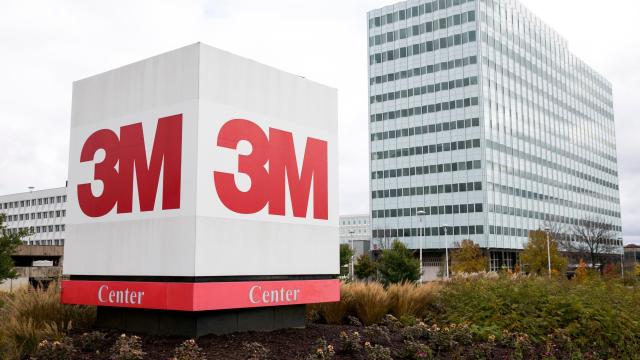Mega-manufacturer 3M, which makes everything from tape to medical masks to electronic components, said it will cease all production of per- and polyfluoroalkyl substances (PFAS) by the end of 2025, in a press statement released Monday. The announcement follows multiple lawsuits and inquiries into pollution linked to the company’s facilities, which have cost 3M billions of dollars and counting.
On top of vowing to “exit all PFAS manufacturing by the end of 2025,” 3M also specified it would “work to discontinue use of PFAS across our product portfolio” on the same timescale. In other words, the company has definitively said it will stop making the chemicals and less definitively said it will try to stop using PFAS compounds in its products. Note that, in theory, this leaves room for 3M to source PFAS from elsewhere and continue using them in the many items it makes.
The company did not directly respond to most of Gizmodo’s questions about the scope and specifics of its PFAS moratorium. However, in an email, 3M spokesperson Carolyn LaViolette wrote, “we have already reduced our use of PFAS over the past three years through ongoing research and development and will continue to innovate new solutions for customers.”
LaViolette declined to answer Gizmodo’s questions about what compounds 3M might use to replace PFAS. More than 20 years ago, the company phased out a particular subset of PFAS known as PFOS and replaced those chemicals with the currently used shorter-chain molecules. Eventually, research determined that those smaller substitute chemicals were no less dangerous (and possibly worse) than their predecessors.
Possible loopholes and further risks aside, 3M ending its manufacture of PFAS is still a big deal. Other corporate giants that have historically employed PFAS, like some fast food chains and apparel makers, have also recently pledged to end their use of the chemicals. But 3M doesn’t just use PFAS; it makes the stuff.
The company was one of the first to develop and begin employing PFAS chemicals in the 1950s. Since then, the hyper-durable compounds have been widely used in non-stick coatings, fire retardants, food packaging, cosmetics, furniture, and elsewhere for their ability to repel water, oil, and grease. Yet, PFAS pose a danger to the environment and human health.
PFAS are commonly referred to as “forever chemicals” because of their extreme stability over time. They don’t degrade naturally in the environment or in our bodies — so instead, they pile up and cause a mountain of problems. Scientific studies have found links between PFAS and multiple cancers, immune deficiencies, high cholesterol, liver disease, delayed infant development, birth defects, and pregnancy complications. And it’s not just people who get sick when PFAS are around. Research has demonstrated that other animals — from alligators to livestock — suffer similar ill health effects from the chemicals.
Unfortunately, avoiding the compounds is nigh impossible thanks to more than 70 years of industrial output. PFAS pollution is basically everywhere, and there isn’t yet a failsafe way to remove them from our water and air .
All of these scientific revelations about the harms of PFAS and the difficulties of cleaning them up have led to mounting regulatory pressure, lawsuits, and scrutiny on the companies that make and use the chemicals, including 3M. Multiple European countries have been considering a total PFAS ban. Within the U.S., the EPA issued an updated health advisory for PFAS earlier this year, effectively declaring that there is no safe level of the chemical in drinking water. In November, the environmental agency ordered 3M to test and clean up the water near its Cordova, Illinois factory.
In one notable 2010 case against 3M, Minnesota’s Attorney General sued the company over pollution associated with its facilities around the state, where 3M is headquartered. Many people in communities near 3M factories, like Oakdale, believe the pollution in their water supply contributed to a local spike in cancer cases and other health problems for residents. The company has publicly denied any blame, and scientific assessments of Oakdale have come to varying conclusions about whether or not the city’s residents suffer from statistically significant elevated cancer rates. However, in 2018, 3M settled with Minnesota to the tune of $US850 ($1,180) million.
The company has faced thousands of lawsuits over PFAS. Ongoing cases include a suit from California’s AG and a consolidated, multidistrict case about firefighting foam that could leave the company on the hook for more than $US30 ($42) billion in damages, according to a report from Bloomberg Law. Contrast that with the $US1.3 ($2) billion to $US2.3 ($3) billion that the company’s own analysis says cutting out PFAS may cost it.
Ultimately, for 3M, leaving forever chemicals in the past is nothing more than shrewd financial calculus. “Our decision is based on an evaluation of the evolving external landscape including regulatory changes and interest in the marketplace for alternatives to PFAS,” LaViolette wrote to Gizmodo.
Nonetheless, the announcement is step toward a safer and healthier world that indicates the persistent efforts of scientists, environmental activists, and legal experts have made a real difference. PFAS is no longer profitable.
For the time being, 3M says it will continue to manufacture PFAS, as the company “intends to fulfil current contractual obligations during the transition period.” But in three years, one chapter of the “forever” saga may finally end.
